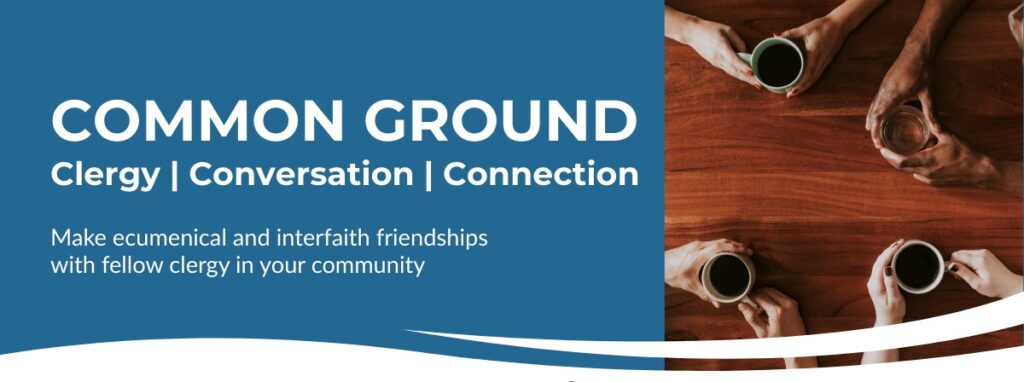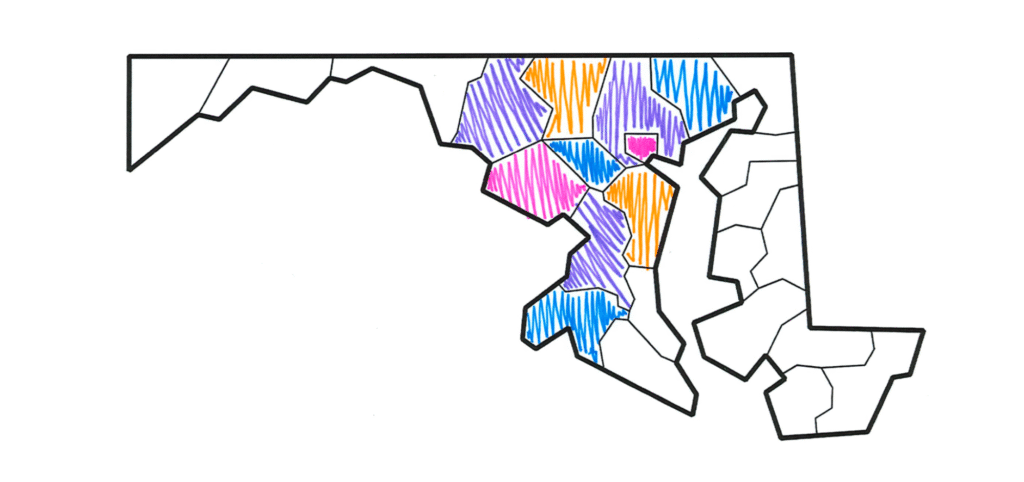Common Ground Resource Page

Welcome to Common Ground! We’re glad you’re here and look forward to sharing this journey with you. This page will be your home base for each session’s prompts and for the Google sheet where you can reflect on and share your experiences after every meeting.

Regions Represented
Baltimore City
Baltimore County
Charles County
Frederick County
Montgomery County
Carroll County
Prince George’s County
Howard County
Harford County
Anne Arundel County
Media Coverage
Baltimore Sun: Gov. Wes Moore partners with faith leaders to bridge Maryland’s deepest divides
Baltimore Jewish Times: Institute for Islamic, Christian and Jewish Studies Begins New Common Ground Project
Kickoff Event
A blessing for finding common ground
As we embark on this journey of finding common ground may we be reminded of our hopes:
To create new friendships
To give witness to unity amongst religious leaders in times of deep divisions
To work together toward a more just society and future
To offer hospitality, mutual respect and dignity in moments this has been denied.
May our connections across this state be a testament to others that hope is still alive even in the most difficult times.
May we go from this place renewed in our commitment to celebrate our diversity and truly find common ground.
—Rev. Alisha Wimbush, Th.D.
Session 1
Preparation before meeting (suggested):
Before the first meeting take time to reflect on the following questions:
Review Dialogue Preparation Checklist (Created by Office of Diversity, Equity and Inclusion at the University of Maryland School of Social Work)
First meeting
Introduce yourself by sharing with your partners how you would like to be called, preferred pronouns, what community you represent, and one thing you would like the group to know about you.
Read Guidelines for Dialogue as a group: https://icjs.org/debate-vs-dialogue/
As a group decide what your community agreements will be:
- How will you show up in the meeting space together?
Here are a few guidelines to consider:-
- We value everyone’s voices, so please speak up and allow space for others to do the same.
-
- Speak from your own experiences; don’t try to tell someone else’s story.
-
- Listen to learn, not to respond.
-
- Remember that we all come from different identities and backgrounds, so please expect a difference of perspective and respect others’ rights to have opinions and views that differ from your own. Don’t invalidate others’ experiences.
-
- In order to promote an open, honest exchange, please respect confidentiality within the group. Identifying stories should stay, but lessons can leave.
-
- This is a learning space, so ask questions and feel free to participate even if you don’t have all the answers.
-
- Are there topics you do not feel comfortable talking about?
- Will you have a set time and place to meet or rotate meeting times and location?
Possible activities and questions for the first meeting
Activity: Sacred Object Storytelling
In preparation for your first meeting with your small group, think about a story that is sacred to you and you feel comfortable sharing with your group. Additionally, you are encouraged to bring a related object that carries with it a story or a history.
- Why did you choose this story and / or object?
- Is this story / object sacred only to you, or does it have meaning for your family / others?
- What makes it sacred? Does it occupy a special place in your home? Do you use this object in any way? Why, or why not?
Please allow time for each group member to share their story and object (3-5 minutes). After each person shares, group members can ask follow up questions about each other’s stories and sacred objects.
Watch: Sharing Your Sacred Story (below).
Activity: Challenging Perceptions
Write three things you think people perceive about your religious identity or community, fairly or unfairly. Share your list with the group.
Discussion Questions:
- Where do you find joy?
- How would friends or family describe you? How would you describe yourself?
- What are you passionate about?
Post-Meeting Reflection
Please spend 5-10 minutes after each small group gathering to reflect on your experience and fill out this Google form.
Session 2
Introduce any new members to the group. Review your community agreements.
Continue to share your sacred object stories.
If you have completed the sacred object storytelling and challenging perceptions exercises here are possible questions to guide your conversation.
- What is your favorite book/movie? Why?
- What brings you hope during this time?
- What gives you spiritual nourishment?
- What did your family teach you about religion?
- What led you to the work you currently do?
Please spend 5-10 minutes after each small group gathering to reflect on your experience and fill out this Google form.
Session 3
Suggested Questions
- Share a story about a person who influenced the values you currently hold.
- How has your understanding of religion and spirituality changed over the years?
- What has been a pivotal moment in your life?
- What are some of the challenges and areas of growth you are facing right now in your community?
- What is a spiritual practice that helps to bring you stability in challenging times?
Please spend 5-10 minutes after each small group gathering to reflect on your experience and fill out this Google form.
Final meeting
During the final meeting take time to reflect on your experience together as a group.
- Go around and share with each member of the group what you learned from them or appreciated about them.
- Share one thing you learned that you will take back to your community.
- As a group, discuss what possible next steps are for you individually and collectively (i.e. will you continue to meet, will you create new groups, will you join a local interfaith group etc.).
Please spend 5-10 minutes after each small group gathering to reflect on your experience and fill out this Google form.
Optional Additional Meetings
While not required, some groups have expressed interest in meeting more than the required for sessions. If you would like to meet more often, you can use these additional prompts for your meetings.